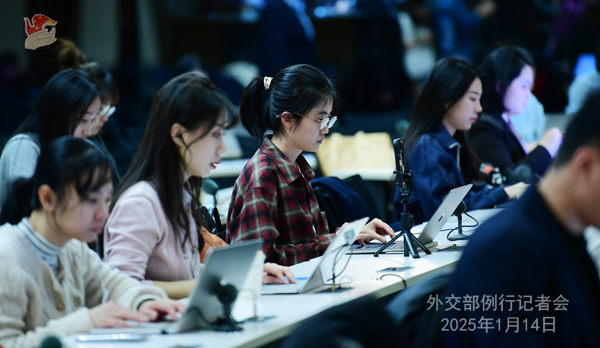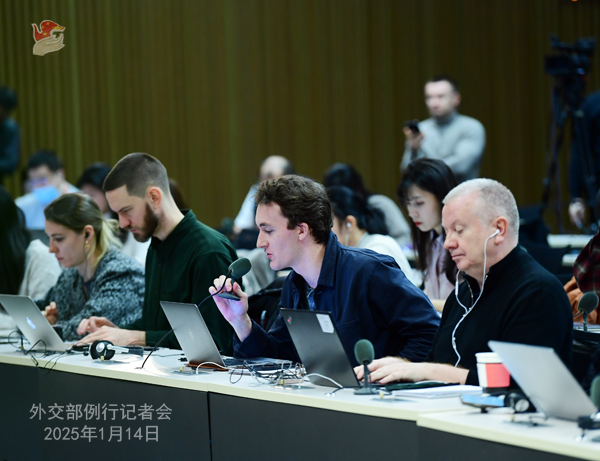
China News Service: The Commerce Department of the US issued new measures on AI export control. What’s China’s comment?
Guo Jiakun: The spokesperson of the Ministry of Commerce has responded to that. Let me stress that the US has been overstretching the concept of national security, politicizing and weaponizing trade and tech issues, and abusing export controls to maliciously suppress China. This has seriously sabotaged market rules and the international economic and trade order, destabilized global industrial and supply chain, and damaged the interests of China, the US and the business community in countries around the world. China firmly opposes the US decision and will take firm measures to safeguard the legitimate and lawful rights and interests of Chinese companies.
AI is humanity’s common asset, and should not become “a game for the rich countries and the wealthy” or be used to generate another development divide. To maintain its supremacy, the US chooses to split the world into tiers, granting access to countries that are “close” and barring access to “the rest.” The real purpose is to deprive developing countries, including China, of the right to make their own progress in science and development. This kind of roadblock strategy hurts the global common interest of promoting AI for good, and has triggered concerns from various quarters about a new tech Cold War from the US. Many US tech companies and industry associations have spoken loud and clear against the measures announced by the Biden administration.
China is an active advocate and practitioner of AI global governance. We put forward the Global Initiative for AI Governance, facilitated UNGA adoption by consensus of the resolution on AI capacity-building, and established the group of friends for international cooperation on AI capacity-building. China will continue to work with all parties to embrace openness, connectivity and equality instead of building walls, decoupling and discrimination, create an open, inclusive, and non-discriminatory environment for AI development that is beneficial to all, and make sure that all countries can access the benefit of AI.
AFP: A spokesman for the Philippines’ National Security Council said today that China’s deployment this month of a coast guard vessel in the South China Sea demonstrates Beijing’s increasing aggression. The spokesman described the Chinese vessel as a “monster ship” that was engaging in intimidation tactics intended to discourage Filipino fishing. Does the Foreign Ministry have a response to this?
Guo Jiakun: We have responded to similar questions multiple times. Let me reiterate that China’s sovereignty and rights and interests in the South China Sea were established in the long course of history, and are solidly grounded in history and the law and compliant with the international law and practice.
China Coast Guard (CCG) conducts patrols and law enforcement activities in relevant waters in accordance with the law, which is fully justified. We call on the Philippines once again to immediately stop all infringement activities, provocations and false accusations, and stop all its actions that jeopardize peace and stability and complicate the situation in the South China Sea.
Global Times: The Global Times recently published a global public survey conducted among over 51,000 respondents in 46 countries. The survey found that more than 90 percent of foreign respondents believe that China’s economy will continue to grow in the next decade, nearly 60 percent believe that China is a major driving force of world economic growth, 63 percent of foreign respondents express a favorable opinion of China, and in terms of different country groups, African countries hold the highest favorable view of China, reaching 84 percent. Nearly 70 percent of overseas respondents look to China to participate in international affairs more and play a greater role. What’s your comment on the survey?
Guo Jiakun: I noted this survey. The figures speak to growing friendships with China around the world.
As the world’s second largest economy, China is committed to high-quality development and high-standard opening up and has long been a top contributor to global economic growth. As the biggest developing country, China belongs to the Global South and its heart and roots are with the Global South. China supports Global South countries in pursuing development and making life better for their people. As a permanent member of the UN Security Council, China advocates true multilateralism, keeps its position fair and just and plays a constructive role in seeking a political settlement on hotspot issues. This has earned China wide recognition from the international community.
No matter how the world may evolve, China will remain a force for peace, growth, progress and good, and will continue working with other countries for a world of greater peace, shared prosperity, mutual learning among civilizations and a community with a shared future for mankind.

Bloomberg: Germany is going to give its armed forces the ability to shoot down unidentified suspected drones that are suspected of targeting for example military bases, industrial facilities and other critical infrastructure. The German cabinet is expected to pass this on Wednesday. This is according to people familiar. My question is why it does not name any specific countries? It’s said that the main suspected culprits are Russia and China. Does the Foreign Ministry have any comment on this move by Germany to give its armed forces the ability to shoot down unidentified suspected drones?
Guo Jiakun: I’m not familiar with what you mentioned. Let me reiterate that we firmly oppose groundless speculations and false accusations against China from relevant parties.
The Paper: Yesterday, the General Office of China’s State Council released a list of measures to foster new growth drivers to boost spending in the culture and tourism sectors. One of the measures is to improve inbound travel policies, including gradually rolling out unilateral visa-free policies to more countries. Recently, China’s visa exemption policies have given a boost to inbound travel. In particular, since the start of the year, “China Travel” has kept trending, and a good number of foreign tourists spent their New Year’s Eve in China. It’s estimated by some travel agencies that the number of travel bookings for the Spring Festival this year will increase by 203 percent year-on-year compared with 2024. What’s your comment?
Guo Jiakun: As China includes more countries in its visa waiver program and improves facilitation measures, the arrivals of foreign tourists have kept rising. In 2024, the number of inbound and outbound travels by foreign nationals stood at 64.882 million, up by 82.9 percent year-on-year. Among them, 20.115 million entered China visa-free, up by 112.3 percent year-on-year. During the just concluded New Year holiday, arrivals of foreign nationals grew by nearly 34 percent year-on-year.
With the Chinese New Year of the Snake half a month away, which is the first Spring Festival since the inscription of the festival on the UNESCO intangible cultural heritage list, we welcome foreign tourists to join China’s celebration of the Spring Festival, experience the joy of the Chinese New Year, feel the warmth of Chinese hospitality, and usher in an auspicious Year of the Snake.
Dragon TV: It’s reported that on January 12, during normal operation, the Wolseong No.2 nuclear power plant in the North Gyeongsang province of the ROK released about 29 tonnes of liquid waste from a storage tank into the sea without prior sample analysis. Staff at the power plant shut the tank’s outlet valve right after finding it being open. According to the analysis of samples from the liquid left in the tank, the concentration of radioactive substances was at normal levels. What’s China’s comment on the leakage of the ROK nuclear power plant?
Guo Jiakun: China noted the incident. From what has been disclosed, the ROK has taken emergency response steps. China will follow closely the follow-ups to the incident.
AFP: Outgoing US President Joe Biden said yesterday in a speech that China would never surpass the United States. He also noted that Washington had managed its ties with Beijing during his four years as President and the relationship “never tipped over into conflict.” Does the Foreign Ministry have any comment on Biden’s speech?
Guo Jiakun: During the past four years, China-US relations have gone through ups and downs, but have remained stable on the whole. Under the strategic guidance of the two presidents, the two sides established through consultation several guiding principles for bilateral ties, engaged in dialogue and cooperation, resumed and created over 20 mechanisms of communication, and achieved outcomes in some areas. At the same time, China stood firm by its principles, safeguarded its sovereignty, security, and development interests, and responded to the US’s wrong actions with resolute countermeasures.
In his meeting with President Biden in Lima, Peru, President Xi Jinping reviewed the experiences from the past four years and listed the inspirations that can be drawn from them, namely, to have a correct strategic perception, match words with actions, treat each other as equals, not to challenge red lines and paramount principles, conduct more dialogue and cooperation, respond to the expectations of the people, and step forward to shoulder the responsibilities of major countries. We hope the US will bear them in mind and work with China in this direction.
NBC: Is China or relevant departments concerned considering any concrete foreign assistance and sympathies for the fight against the still-burning wildfires in Los Angeles now considered as the most catastrophic in the US history?
Guo Jiakun: We mourn for the lives lost in the raging wildfires in the Los Angeles area, and express sympathies to those who are injured, their families and those who have lost loved ones to the fire.
